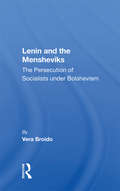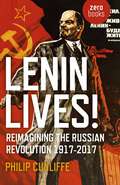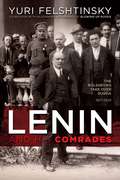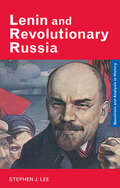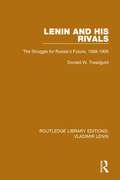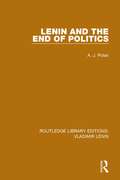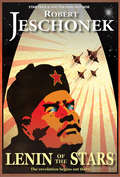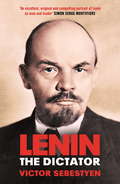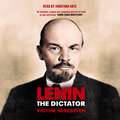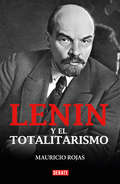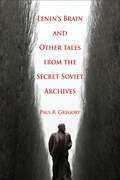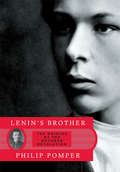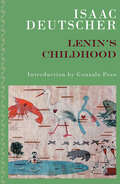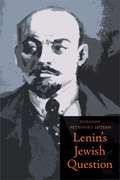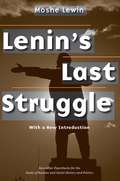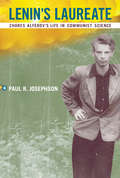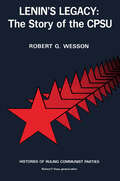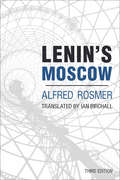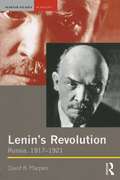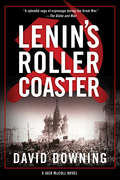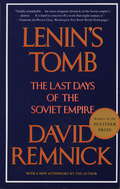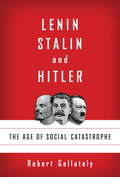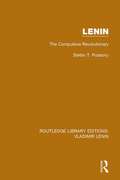- Table View
- List View
Lenin And The Mensheviks: The Persecution Of Socialists Under Bolshevism
by Vera BroidoThis book focuses on the persecution of the Mensheviks and other Russian socialists and Anarchists, whose fate was much the same. It is about the years of wars and upheavals, the enforced migrations and how the Mensheviks had managed to keep a social community and a political culture in being.
Lenin Lives!: Reimagining the Russian Revolution 1917-2017
by Philip CunliffeOf all the tomes published on the centenary of the Russian Revolution, none will reckon with a key part of the story: what if the revolutionaries' dreams had come true, instead of being dashed? Yet, no tale of the Russian Revolution is complete without asking 'what if ...?' Lenin Lives! lays out a narrative account of how history might have happened differently if Lenin had lived long enough to see the global spread of the Russian Revolution to Western Europe and the USA. In one alternative world, instead of the grim authoritarian and autarkic states of the East, socialist revolution in the world&’s most advanced economies ushers in an era of global peace, progress and prosperity, with global federations substituting for nation-states and international organisations. In keeping with the hopes of European revolutionaries of the time, the early achievement of socialism leads to a drastic improvement in human progress, economic growth, democracy and freedom at the global level.
Lenin and His Comrades
by Yuri FelshtinskyWhat was the real impact and significance of the October Revolution of 1917? This avowedly revisionist interpretation by a major Russian dissident seeks to place Lenin and those around him in the proper perspective. Since the takeover of Russia was the result of a coup d'état by a tiny minority of criminals that Yuri Felshtinsky doesn't hesitate to call gangsters, the Communist regime was doomed from the start.Yuri Felshtinsky received a PhD in history from Rutgers University. His books include The Failure of the World Revolution (1991), Blowing up Russia (with Alexander Litvinenko, 2007), and The Corporation: Russia and the KGB in the Age of President Putin (with Vladimir Pribylovsky, 2008). He lives near Boston, Massachusetts.
Lenin and Revolutionary Russia (Questions and Analysis in History)
by Stephen J. LeeLenin and Revolutionary Russia examines the background to and the course of the Russian Revolution of 1917 and Lenin's regime. It explores all the key aspects such as the development of the Bolsheviks as a revolutionary party, the 1905 Revolution, the collapse of the Tsarists, the Russian Civil War and historical interpretations of Lenin's legacy to Russian history.
Lenin and his Rivals: The Struggle for Russia's Future, 1898-1906 (Routledge Library Editions: Vladimir Lenin #6)
by Donald W. TreadgoldOriginally published in 1955, this is an illuminating study of the political thought and action of the Russian intelligentsia, in the decade up to and including the Revolution of 1905-6. It is based on the writings, including those in the revolutionary press, by which the chief figures of the main opposition parties expressed their political theory, strategy and tactics and related them to the turbulent events of those years. It is also based on personal interviews with some of the survivors of these political struggles. The book is focused on the emergence, starting in 1889 of the major political parties in Russia and it tells of their efforts to form a common front against Tsarism in the revolution which they confidently expected in the early years of the century.
Lenin and the End of Politics (Routledge Library Editions: Vladimir Lenin #2)
by A. J. PolanOriginally published in 1984 this book reconsiders the effect of Lenin on the politics and culture of the 20th Century. In a detailed examination of Lenin's famous text, The State and Revolution, the author argues that the peculiar status of this work presents readers with major problems of interpretation and shows how a failure to identify these problems has prevented an adequate understanding of important issues in modern politics, history and social theory. The book compares Lenin's 'radical utopia' with the ideas of politics offered by other theorists, centrally Weber and Sartre, but also writers such as Jefferson and Habermas. This original approach shows the impact of Lenin's text on political history and theory and leads to a new understanding of the connection between revolution and violence, social change and authoritarianism.
Lenin of the Stars
by Robert T. Jeschonek Ben BaldwinLenin came from outer space! He and his fellow shape-changing aliens bring communism to Earth, hoping to teach galactic harmony to violent humanity. Communist aliens posing as legendary leaders steer great nations through the turbulent history of the Twentieth Century. But changing times and surprising turnarounds lead the aliens to fight a secret civil war among their own ranks. When the alien Lenin and his beloved Irina end up on opposite sides, they have no choice but to battle to the death...or start a new revolution that might just sweep the stars. Don't miss this exciting tale by award-winning storyteller Robert T. Jeschonek, a master of unique and unexpected science fiction that really packs a punch.
Lenin the Dictator
by Victor Sebestyen'A fresh, powerful portrait of Lenin' Anne Applebaum, author of Red Famine'Richly readable ... An enthralling but appalling story' Francis Wheen, author of Karl MarxThe cold, one-dimensional figure of Lenin the political fanatic is only a partial truth. Drawing on extensive material that has only recently become available, Sebestyen's gripping biography casts an intriguing new light on the character behind the politics.In reality, Lenin was a man who loved nature as much as he loved making revolution, and his closest relationships were with women. He built a state based on terror. But he was a highly emotional man given to furious rages and deep passions. While never ignoring the politics, Sebestyen examines Lenin's inner life, his relationship with his wife and his long love affair with Inessa Armand, the most romantic and beguiling of Bolsheviks. These two women were as significant as the men - Stalin or Trotsky - who created the world's first Communist state with him.
Lenin the Dictator
by Victor SebestyenVictor Sebestyen's intimate biography is the first major work in English for nearly two decades on one of the most significant figures of the twentieth century. In Russia to this day Lenin inspires adulation. Everywhere, he continues to fascinate as a man who made history, and who created a new kind of state that would later be imitated by nearly half the countries in the world.Lenin believed that the 'the political is the personal', and while in no way ignoring his political life, Sebestyen's focus will be on Lenin the man - a man who loved nature almost as much as he loved making revolution, and whose closest ties and friendships were with women. The long-suppressed story of his ménage a trois with his wife, Nadezhda Krupskaya, and his mistress and comrade, Inessa Armand, reveals a different character to the coldly one-dimensional figure of legend.Told through the prism of Lenin's key relationships, Sebestyen's lively biography casts a new light the Russian Revolution, one of the great turning points of modern history.Read by Jonathan Aris(p) 2017 Orion Publishing Group Ltd
Lenin the Dictator: The Man, The Dictator, And The Master Of Terror
by Victor Sebestyen'A fresh, powerful portrait of Lenin' Anne Applebaum, author of Red Famine'Richly readable ... An enthralling but appalling story' Francis Wheen, author of Karl MarxThe cold, one-dimensional figure of Lenin the political fanatic is only a partial truth. Drawing on extensive material that has only recently become available, Sebestyen's gripping biography casts an intriguing new light on the character behind the politics.In reality, Lenin was a man who loved nature as much as he loved making revolution, and his closest relationships were with women. He built a state based on terror. But he was a highly emotional man given to furious rages and deep passions. While never ignoring the politics, Sebestyen examines Lenin's inner life, his relationship with his wife and his long love affair with Inessa Armand, the most romantic and beguiling of Bolsheviks. These two women were as significant as the men - Stalin or Trotsky - who created the world's first Communist state with him.
Lenin y el totalitarismo
by Mauricio RojasAl conmemorarse el centenario de la Revolución rusa, Mauricio Rojas presenta un polémico y agudo perfil sobre Lenin A partir de una reflexión histórica sobre la situación política y social en Rusia desde finales del siglo XIX y principios del XX, el autor describe la creación y auge del partido bolchevique y, principalmente, lo que denomina "contrarrevolución de octubre", es decir, el paso del ideal revolucionario iniciado con los sóviets al terror contra el pueblo ruso. De esta manera, Rojas explica y describe el sistema totalitario bajo el régimen de Lenin y Stalin, centrándose en el "Gran Terror" que azotó al pueblo ruso durante gran parte del siglo XX. Con un relevante análisis de textos escritos de puño y letra por el líder de la Revolución rusa, la propuesta presentada en este ensayo, que expone las contradicciones y brutalidades realizadas durante décadas en nombre de la utopía comunista, interpela al lector invitándolo a pensar de otro modo la importancia de este momento crucial en la historia de la humanidad.
Lenin's Brain and Other Tales from the Secret Soviet Archives
by Paul R. GregoryAn enlightening look into the once-secret Soviet state and party archives that Western scholars first gained access to in the early 1990s. Paul Gregory breaks down a decades-old wall of secrecy to reveal intriguing new information on such subjects as Stalin's Great Terror, the day-to-day life of Gulag guards, the Soviet invasion of Afghanistan, the scientific study of Lenin's brain, and other fascinating tales.
Lenin's Brother: The Origins of the October Revolution
by Philip PomperThe gripping untold story of a terrorist leader whose death would catapult his brother--Lenin--to revolution. In 1886, Alexander Ulyanov, a brilliant biology student, joined a small group of students at St. Petersburg University to plot the assassination of Russia's tsar. Known as "Second First March" for the date of their action, this group failed disastrously in their mission, and its leaders, Alexander included, were executed. History has largely forgotten Alexander, but for the most important consequence of his execution: his younger brother, Vladimir, went on to lead the October Revolution of 1917 and head the new Soviet government under his revolutionary pseudonym "Lenin." Probing the Ulyanov family archives, historian Philip Pomper uncovers Alexander's transformation from ascetic student to terrorist, and the impact his fate had on Lenin. Vividly portraying the psychological dynamics of a family that would change history, Lenin's Brother is a perspective-changing glimpse into Lenin's formative years--and his subsequent behavior as a revolutionary.
Lenin's Childhood
by Isaac DeutscherWhen he died suddenly in 1967, Isaac Deutscher had completed only the compelling first chapter of a long-anticipated biography of Lenin, published here. It covers Lenin&’s family background, birth and early years in the backwater town of Simbirsk up to the execution of his brother, a traumatic formative event. Drawing on a lifetime of background research, including access to the closed section of Trotsky&’s archives, Lenin&’s Childhood gives a novel interpretation of the earliest influences on Lenin&’s personality and thinking. Most of all, it is a glimpse into an unfinished work which would have striven to save Lenin from fanatical anti-revolutionary condemnation and, perhaps more important, from uncritical communist beatification.This anniversary edition includes an introduction by Deutscher's biographer, Gonzalo Pozo, which situates the Lenin project within Deutscher&’s oeuvre and discusses the sources, influences and evolution of his never completed life of Lenin.
Lenin's Jewish Question
by Yohanan Petrovsky-ShternIn this first examination of Lenin’s genealogical and political connections to East European Jews, Yohanan Petrovsky-Shtern reveals the broad cultural meanings of indisputable evidence that Lenin’s maternal grandfather was a Jew. He examines why and how Lenin’s Jewish relatives converted to Christianity, explains how Lenin’s vision of Russian Marxism shaped his identity, and explores Lenin’s treatment of party colleagues of Jewish origin and the Jewish Question in Europe. Petrovsky-Shtern also uncovers the continuous efforts of the Soviet communists to suppress Lenin’s Jewishness and the no less persistent attempts of Russian extremists to portray Lenin as a Jew. In this fascinating book, Petrovsky-Shtern expands our understanding not only of Lenin, but also of Russian and Soviet handling of the Jewish Question.
Lenin's Last Struggle
by Moshe LewinOne of the great political strategists of his era, V. I. Lenin continues to attract historical interest, yet his complex personality eludes full understanding. This new edition of Moshe Lewin's classic political biography, including an afterword by the author, suggests new approaches for studying the Marxist visionary and founder of the Soviet state. Lenin's Last Struggle offers invaluable insights into the rise of the Bolshevik party and the Soviet Union, a saga complicated by complex strategic battles among the leaders of Lenin's generation: leaders whose names are universally known, but whose personalities and motivations are even now not sufficiently understood.
Lenin's Laureate: Zhores Alferov's Life in Communist Science (Transformations: Studies in the History of Science and Technology)
by Paul R. JosephsonThe life and work of a leading Soviet physicist and an exploration of the strengths and weaknesses of Soviet science from Stalin through Gorbachev.In 2000, Russian scientist Zhores Alferov shared the Nobel Prize for Physics for his discovery of the heterojunction, a semiconductor device the practical applications of which include LEDs, rapid transistors, and the microchip. The Prize was the culmination of a career in Soviet science that spanned the eras of Stalin, Khrushchev, and Gorbachev—and continues today in the postcommunist Russia of Putin and Medvedev. In Lenin's Laureate, historian Paul Josephson tells the story of Alferov's life and work and examines the bureaucratic, economic, and ideological obstacles to doing state-sponsored scientific research in the Soviet Union. Lenin and the Bolsheviks built strong institutions for scientific research, rectifying years of neglect under the Czars. Later generations of scientists, including Alferov and his colleagues, reaped the benefits, achieving important breakthroughs: the first nuclear reactor for civilian energy, an early fusion device, and, of course, the Sputnik satellite. Josephson's account of Alferov's career reveals the strengths and weaknesses of Soviet science—a schizophrenic environment of cutting-edge research and political interference. Alferov, born into a family of Communist loyalists, joined the party in 1967. He supported Gorbachev's reforms in the 1980s, but later became frustrated by the recession-plagued postcommunist state's failure to fund scientific research adequately. An elected member of the Russian parliament since 1995, he uses his prestige as a Nobel laureate to protect Russian science from further cutbacks.Drawing on extensive archival research and the author's own discussions with Alferov, Lenin's Laureate offers a unique account of Soviet science, presented against the backdrop of the USSR's turbulent history from the revolution through perestroika.
Lenin's Legacy
by Robert WessonThis concise monograph traces Russian Marxism from its beginnings to mid-1977, shows how and why the party achieved power, how it has strengthened its position, and how it has undertaken to remold the country and to solve its internal problems. Wesson's study is the only up-to-date party history currently available. The book opens with background material on Russian discontent and endeavors to analyze the fundamental nature of Communist Party rule, taking into account new perspectives in Lenin's revolution, the Stalinist period, and the Khrushchev years, as well as the latest period not covered in earlier accounts. It treats the rise of Lenin, the struggle for power after Lenin and after Stalin, and the consolidation of Brezhnev's authority. As the most recent history of communism in the Soviet Union, it has great topical interest and is clearly written for the benefit of the student and general reader as well as the professional.
Lenin's Moscow
by Alfred Rosmer Ian BirchallWhen Alfred Rosmer arrived in Russia in 1919 it was considered by millions to be the center of world revolution. It was also a society beleaguered by civil war and encircled by hostile powers seeking to snuff out the promise and potential the first successful workers' revolution represented. It was in this context that revolutionaries from across the globe undertook the creation of the Communist International, hoping to forge an instrument to fan the flames of the struggle against global capitalism.In this gripping political memoir of his time in Moscow, Rosmer draws on his unique perspective as both a delegate to the Comintern-and as a member of its Executive Committee-to paint a stunning and inspiring picture of the early years of Soviet rule. From the debates sparked by the publication of Lenin's State and Revolution and Left-Wing Communism to the efforts of the International to extend its influence beyond Europe with the Congress of the Peoples of the East in Baku, Rosmer documents key developments with an unparalleled clarity of vision and offers invaluable insights.
Lenin's Revolution: Russia, 1917-1921 (Seminar Studies)
by David R. MarplesThis study examines one of the key events in history, the Russian Revolution. Since the late Gorbachev period, a wealth of new material has become available to historians that has triggered intense scholarly debate on the nature of revolution. This timely new book takes account of the new scholarship, including - for example - the role of Lenin. It is argued that the intial flexibility of Lenin and the Bolshevik party allowed them to take power, but that the conduct of both changed considerably once they were obliged to take steps to maintain their authority. This book charts the Febuary Revolution, the October Revolution, the Civil War and the main individuals involved, giving a remarkable degree of clarity to the tumultuous events in Russia whose consequences the world lived with for the rest of the twentieth century.
Lenin's Roller Coaster
by David DowningIn Russia the Bolshevik revolution is in full-swing while the supposed Great War is destroying Europe in ways never before imagined. Fulltime lovers and part-time enemies, British spy Jack McColl and progressive American journalist Caitlin Hanley, have seen their relationship survive this far but in a world defined by “win at all cost” attitudes how much longer can they hold out?Winter 1917: As a generation of Europe’s young men perish on the Eastern and Western fronts, British spy Jack McColl is assigned a sabotage mission deep in Central Asia, where German influence is strong. The mission only becomes more dangerous the closer he gets to its heart. Meanwhile, the woman he loves, Irish-American radical journalist Caitlin Hanley, is in Bolshevik Russia, thrilled to have the chance to cover the Revolution. Caitlin knows Moscow is where she is meant to be during this historic event—even if she is putting her own life at risk to bear witness.But four years of bloody war have taken their toll on all of Europe, and Jack and Caitlin’s relationship may become another casualty. Caitlin’s political convictions have always been for progress, feminism, and socialism—often diametrically opposed to the conservative goals of the British Empire Jack serves. Up until now, Jack and Caitlin have managed to set aside their allegiances and stay faithful to each other, but the stakes of their affair have risen too high. Can a revolutionary love a spy? And if she does, will it cost one of them their life?
Lenin's Tomb: The Last Days of the Soviet Empire
by David RemnickIn the tradition of John Reed's classic Ten Days That Shook the World, this bestselling account of the collapse of the Soviet Union combines the global vision of the best historical scholarship with the immediacy of eyewitness journalism. "A moving illumination . . . Remnick is the witness for us all." --Wall Street Journal.<P><P> Pulitzer Prize Winner
Lenin, Stalin, and Hitler: The Age of Social Catastrophe
by Robert GellatelyA bold new accounting of the great social and political upheavals that enveloped Europe between 1914 and 1945—from the Russian Revolution through the Second World War.In Lenin, Stalin, and Hitler, acclaimed historian Robert Gellately focuses on the dominant powers of the time, the Soviet Union and Nazi Germany, but also analyzes the catastrophe of those years in an effort to uncover its political and ideological nature. Arguing that the tragedies endured by Europe were inextricably linked through the dictatorships of Lenin, Stalin, and Hitler, Gellately explains how the pursuit of their “utopian” ideals turned into dystopian nightmares. Dismantling the myth of Lenin as a relatively benevolent precursor to Hitler and Stalin and contrasting the divergent ways that Hitler and Stalin achieved their calamitous goals, Gellately creates in Lenin, Stalin, and Hitler a vital analysis of a critical period in modern history.
Lenin: The Compulsive Revolutionary (Routledge Library Editions: Vladimir Lenin #3)
by Stefan T. PossonyOriginally published in the UK in 1966, this was the first biography of Lenin which tied together extensive material unearthed in WWII, and it illuminates the complex personality and explains the riddle of Lenin's seemingly impossible rise to power. Using primary sources such as previously inacessible documents from the German, Austrian and Japanese foreign offices, and the vast holdings of the Hoover Institution, the book cuts through many comtemporaneous myths in Communist sources. The volume is a landmark in the study of the birth of Soviet Communism and its revolutionary enterprise.
